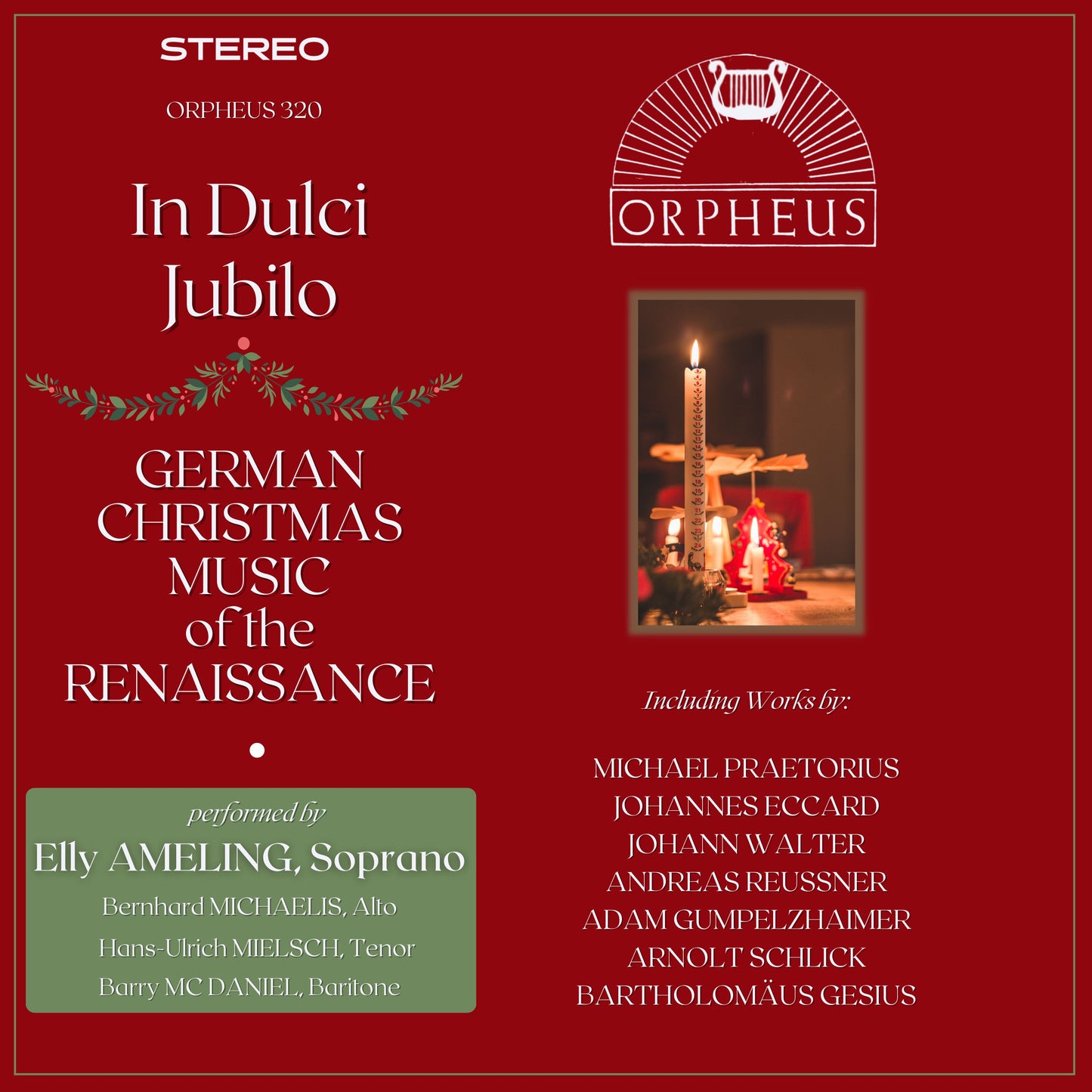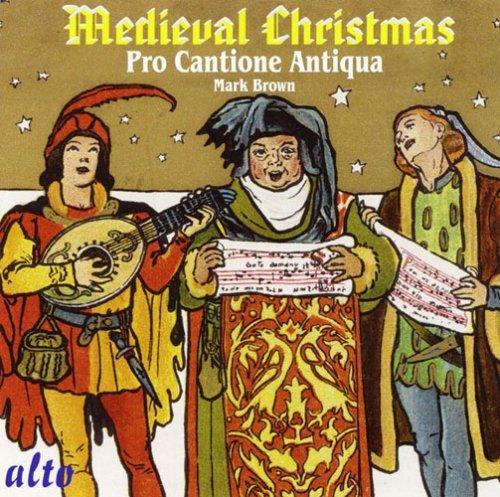
ORPHEUS
IN DULCI JUBILO - ELLY Ameling, Bernhard MICHAELIS, Hans-Ulrich MIELSCH, Barry McDANIEL (Digital Download)
IN DULCI JUBILO - ELLY Ameling, Bernhard MICHAELIS, Hans-Ulrich MIELSCH, Barry McDANIEL (Digital Download)
FORMAT (CD, LP, DVD?)
FORMAT (CD, LP, DVD?)
DIGITAL MUSIC DOWNLOAD
Couldn't load pickup availability
THIS DOWNLOAD INCLUDES A BOOKLET WITH TEXTS AND NOTES

Elly AMELING, Soprano - Bernhard MICHAELIS, Alto - Hans-Ulrich MIELSCH, Tenor - Barry McDANIEL, Baritone
Hans-Martin LINDE, Baritone, Recorder & Krummhorn
Ilse BRIX-MEINERT & Ulrich KOCH, Violas da braccio - Johannes KOCH, Viola da gamba
Walter GERWIG, Lute
One of the most “human’” festivals of the Christian year is Christmas, the mystery of the Incarnation of the Son of God, who comes to Bethlehem as a child to the poor and the weak, who begins his work of redemption among peasants, shepherds and artisans, a poor child before whom the mighty ones of the earth bow down, before whom tyrants tremble.
These were all signs of man’s awareness of himself, of his discovery of humanitarian resources, of a simultaneous humanising of political and social as well as of religious life. All hinged however on the birth of Christ; this brought to earth the pristine image of man, man became brother to the Son of God and thereby for the first time attained his full dignity.
Whereas the church of the first millennium set the ceremonial triumph of the Epiphany at the heart of the celebrations as the principal feast in the adoration of the newly manifested King, as the eastern Church does to this day, Christmas from late medieval times onward came to be more and more the festival at which the individual man could express himself. The endeavours during these centuries to achieve a renewal of religion, the Devotio moderna, which radiated from the Netherlands throughout the whole of Europe and which has survived till our own day in the “Imitation of Christ” of Thomas à Kempis, the German mysticism of Ekkehart and Tauler, principally however on the Reformation and Counter-Reformation -- these were signs of man's awareness of himself, of his discovery of humanitarian resources, of a simultaneous humanizing of political and social as well as of religious life. All hinged however on the birth of Christ; this brought to earth the pristine image of man, man became brother to the Son of God and thereby for the first time attained his full dignity.
But Christmas brought not only a personal encounter with the “man-born” God; it became a festival of the family, which could now regard itself as an image of the family at Bethlehem; it became a festival of brotherly Concord.
The events of the Holy Night as depicted by thee evangelists continued to bring into being new colors, values and sounds. The wealth of songs which sprang up in Germany is great indeed. The early song collections of the 16th century have all a family likeness, whether printed in Breslau, Hamburg, Königsberg or Cologne. Reformation and Counter-Reformation alike contributed harmoniously to the embellishment of these songs.

MICHAEL PRAETORIUS (1571-1621)
1 In dulci jubilo - 3 & 4 voices
from Musae Sioniae, Vol. 5, Wolfenbuttel 1607 (6:08)
BARTHOLOMÄUS GESIUS (ca. 1560-1613)
2 Christum wir sollen loben schon - 3 voices from Geistliche Deutsche Lieder, Frankfurt a. d. Oder, 1601 Text: German version of the hymn A solis ortus cardine (7:19)
MICHAEL PRAETORIUS
A solis ortus cardine – 3 voices
from Hymnodia Sioniae, Hamburg, 1611
BARTHOLOMÄUS GESIUS
3 Ein Kind geborn zu Bethlehem - 4 voices
from Geistliche Deutsche Lieder, 1601 (3:35)
MICHAEL PRAETORIUS
Ein Kind geborn zu Bethlehem – 2 & 3 voices
from Musae Sioniae, Vol. 5 Text: German version of Puer natus in Bethlehem
4 Es ist ein Ros entsprungen - 4 voices
from Musae Sioniae, Vol. 6 Text: Das alt Catholisch Christliedlein, Köln, 1599 (3:47)
JOHANNES ECCARD (1553-1611)
5 Ubers Gebirg Maria geht - 5 voices
from Ander Teil, Preussischen Festlieder, Königsberg, 1644 Text: Ludwig Helmbold (6:04)
JOHANN WALTER (1496-1570)
6 Gelobet seist du, Jesu Christ – 4 voices
from Wittembergisch Geistlich Gesangbüchlein, 1551 Text: V. 1, prereformation; V. 2-5, Martin Luther (3:19)
ANDREAS REUSSNER (the Elder)
7 Uns ist ein Kindlein heut geborn – lute setting
from Musicalischer Lustgarten, Breslau, 1645 (2:53)
ADAM GUMPELZHAIMER (1559-1625)
8 Vom Himmel hoch da komm ich her - 4 voices from Zwei schöne Weihenacht Lieder, Augsburg. 1618 Text: Martin Luther (3:25)
ARNOLT SCHLICK (ca. 1455 ca. 1525)
9 Maria zart - 3 voices
from Tabulaturen Etlicher Lobgesang und lidlein off die orgeln un lauten, Mainz, 1512 (4:35)

MORE HOLIDAY MUSIC
-
A CHRISTMAS CELEBRATION: Christmas At The Royal Opera House - The Nutcracker & Hansel and Gretel - Royal Opera House (3 DVDs)
Regular price €6,95 EURRegular price -
A CHRISTMAS GIFT FOR YOU - PHIL SPECTOR
Regular price €6,95 EURRegular price -
A CLASSICAL CHRISTMAS (VOX BOX EDITION)
Regular price €3,95 EURRegular price -
A MEDIEVAL CHRISTMAS - PRO CANTIONE ANTIQUA (Digital Download)
Regular price €4,95 EURRegular price -
A VICTORIAN CHRISTMAS - CAROLS, SONGS AND SOLOS
Regular price €6,95 EURRegular price -
ADVENT FROM WINCHESTER "O COME, EMMANUEL" - WINCHESTER CATHEDRAL CHOIR, LUMSDEN
Regular price €6,95 EURRegular price -
AN ENGLISH TRADITIONAL CHRISTMAS - Carols from the Great Cathedrals and Abbeys (DIGITAL DOWNLOAD BOXED SET)
Regular price €0,95 EURRegular price -
ANDRE RIEU: Silver Bells (CD + DVD)
Regular price €5,95 EURRegular price -
ANDREA BOCELLI - A Family Christmas (Deluxe Edition)
Regular price €5,95 EURRegular price -
BIG CHRISTMAS BOX (13 HOUR DIGITAL DOWNLOAD)
Regular price €0,95 EURRegular price -
BIG CHRISTMAS BOX 2 (4 Hour Digital Download)
Regular price €0,95 EURRegular price -
CHRISTMAS ANGELS - A THOUSAND VOICES SING IN LINCOLN CATHEDRAL
Regular price €6,95 EURRegular price -
Christmas at Trinity - George Baker, Choir of Trinity Episcopal Church, Portland, OR
Regular price €4,95 EURRegular price -
Christmas Bundle 2025 - 16 CDs, 1 DVD
Regular price €21,95 EURRegular price -
CHRISTMAS CAROLS AND MOTETS - ALFRED DELLER AND THE DELLER CONSORT (5 HOUR DIGITAL DOWNLOAD)
Regular price €0,95 EURRegular price -
CHRISTMAS CAROLS FROM WESTMINSTER ABBEY CHOIR
Regular price €6,95 EURRegular price -
CHRISTMAS CAROLS OF VAUGHAN WILLIAMS - CARDIFF FESTIVAL CHOIR
Regular price €6,95 EURRegular price -
CHRISTMAS FAVORITES BUNDLE (4 CDS + 2 DVDS)
Regular price €21,95 EURRegular price -
CHRISTMAS FROM GLOUCESTER: SEE AMID THE WINTER'S SNOW - GLOUCESTER CATHEDRAL CHOIR
Regular price €6,95 EURRegular price -
Christmas Hits: The Ultimate Collection (5 CDs)
Regular price €5,95 EURRegular price





















